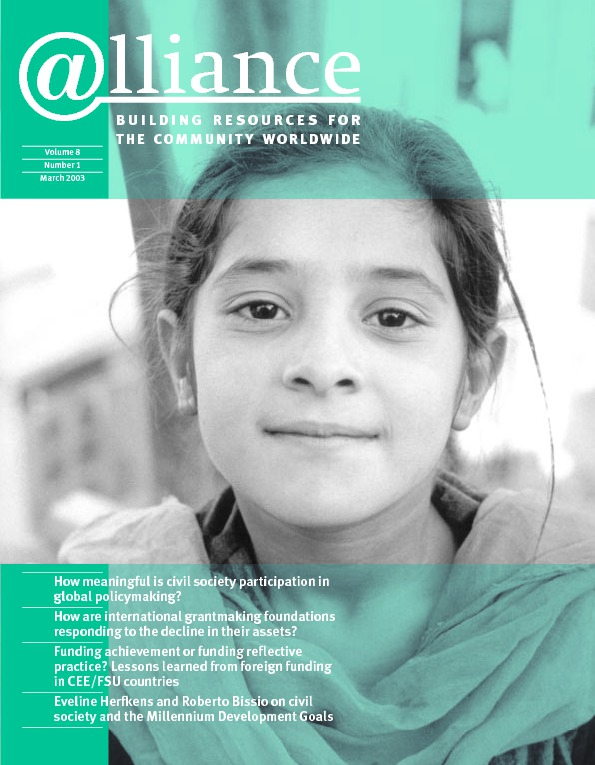This column provides highlights of recent legal and fiscal developments affecting non-profit organizations (NPOs). It is necessarily selective. Further information on these and other relevant subjects can be found in the Autumn 2002 issue of SEAL Magazine or the December 2002 issue of the International Journal of Not-for-Profit Law (IJNL).[1]
Canada
Canadian provinces have been busy during the past year enacting legislation to tighten up the rules on charity fundraising. The legislation is not consistent among the provinces, which means that charities raising funds across Canada need to be aware of trying to suit their fundraising activities to these varying requirements.
In Saskatchewan, where the most recent legislation was enacted (it took effect on 1 January) the focus has been on ‘fundraising businesses’ (FRBs). Among other things, the new law sets up a registration and licensing regime for FRBs. It also regulates the manner in which FRBs are permitted to approach the public, placing restrictions on various forms of intrusive solicitation. Other provinces that have tried to deal with these issues in recent years include Alberta, Manitoba and Prince Edward Island.
Legislation that protects the public from unscrupulous fundraisers and fundraising practices is common in many countries. The issue is always one of balance between the need for charities to ‘get the word out’ and the desire of the public not to be unduly burdened by fundraising organizations. It remains to be seen whether a more intrusive approach will have more impact than a simple registration regime. One thing is certain: there are greater paperwork burdens for charities raising money in provinces with more comprehensive legislation.
See the Canada update in the December 2002 issue of IJNL.
China
Two conferences held in China in November and December 2002 indicate that the Chinese government is working towards new regulations/legislation for parts of the non-profit sector. Both conferences were attended by foreign representatives, who brought their own experiences to the attention of the Chinese participants.
The November conference was held in Shanghai and was sponsored by the Ministry of Civil Affairs Administrative Bureau of NGOs and the Shanghai Civil Affairs Bureau. The theme was ‘The Development and Administration of NPOs’. Attended by over 150 people, representing local Bureaus of Civil Affairs from around China, NPO leaders, foreign representatives, lawyers, and members of the press, the conference revolved around four major themes: legal issues; self-regulation of NPOs; mechanisms for innovation within NPOs; and the situation of trade associations (and the way in which these newly recognized legal entities affect China’s entry into the WTO).
Ms Jiang Li, Vice Minister of Civil Affairs, one of several major government speakers, stressed that ‘the development of trade associations and innovations of the NPO system [will] improve the overall quality of Chinese NPOs, raise the level of governmental administration over the NPOs, and further enable NPOs to play a positive role in China’s modernization’. Government officials also seemed willing to listen to some fairly contentious debate about the way government-NPO interaction works at the present time. One outcome of the conference is a new project to translate more foreign laws into Chinese to help the government develop a more modern legal system for Chinese NPOs.
The second conference, on ‘Formulating Regulations for the Administration of Foundations’, was more of a workshop, attended by a far more limited number of people. It was sponsored by the Office of Legislative Affairs of the State Council; participants included both Chinese and foreign foundation specialists. John Edie, outgoing General Counsel of the Council on Foundations, reports that ‘1) The Chinese clearly had done their homework. 2) The government seemed genuinely open to good ideas and interested in learning. 3) Yet, they were also not volunteering much detail or information. 4) It was significant that they provided time for Chinese NPO representatives to contribute. 5) They do not seem to be in a big hurry, but we urged them to get rules in place soon.’
For more information on both conferences, see the longer reports in the December 2002 issue of IJNL.
Documents for the Shanghai conference are available on the website of the Shanghai Bureau of Civil Affairs at http://www.iecforsw.com/seminar.htm
Germany
A comprehensive model for a Land (state) foundation law for Germany was published in the December 2002 issue of Maecenata Aktuell. The model is important because it responds to the reform of the federal German law relating to foundations passed by parliament in September 2002. It is presently available only in German, but an English analysis will be available in an upcoming issue of IJNL.
For a report on the recent reform, see the ‘Snapshots’ column in the December 2002 issue of Alliance.
Russia
The Russian Government has agreed to reconsider the taxation of grants, according to a report published in the December edition of e-seal. On 14-16 October 2002, members of the European Foundation Centre Governing Council met with the heads of leading Russian foundations and public officials. During meetings with the EFC delegation, the Deputy Prime Minister Valentina Matvienko and the Deputy Chief of the President’s Administration Vladislav Surkov promised to look for a solution to the present situation, which penalizes foreign foundations and their grantees by making grant recipients pay tax on grants coming into the Russian Federation (except under certain conditions). A consultative committee has been set up to make recommendations to the government. CAF Russia, a member of the committee and also of the EFC delegation, has been charged with preparing a comprehensive report.
To read a report on the EFC mission to Russia, please go to http://www.efc.be/ftp/public/gc/RM_Report.doc or see the December 2002 issue of Alliance.
Scotland
The Scottish Executive has issued its report on Charity Regulation in Scotland, a response to the Scottish Charity Law Review Commission (also called McFadden). The new report ‘accepts the thrust of the McFadden report – that there should be better regulation of and support for charities in Scotland’.
The main features proposed by the Executive are:
- There should be a modern definition of charity applicable throughout the UK, including Scotland. The report suggests that there should be more input from throughout the UK into the Cabinet Office Strategy Unit’s process of developing a new definition, which was reported on in the ‘Snapshots’ column in the December issue of Alliance.
- There should be a comprehensive register of Scottish charities.
- There should be a ‘new regulatory body with wide-ranging functions’, including registration; monitoring and supervision; investigation; support and information. This acceptance of a ‘charity commission-like’ entity seems to be in accord with developments in other Commonwealth countries.
- More support and advice should be given to charities and their trustees.
The report contains a comprehensive parallel analysis of the suggestions of the McFadden Report. Further analysis will be found in an upcoming issue of IJNL.
The report can be found on the website of the Scottish Executive at http://www.scotland.gov.uk/library5/justice/mcfadden_response.pdf
United Kingdom
British charities have lost £78 million (€122 million) since the introduction of tax changes in April 2000, according to the Charities Aid Foundation (CAF). Until then, companies made donations to charities after tax, leaving charities to reclaim the tax paid from the Inland Revenue. Since April 2000, companies making gifts, rather than charities, have been able to claim tax reliefs. It was hoped that this would boost corporate giving, but instead charities have lost the income from reclaimed taxes, while companies have not increased their giving to compensate for this.
Despite these results, CAF still supports the tax modernization of 2000 but would like to work with the government and other partners to ensure that companies understand the changes and continue to increase their giving. A public education campaign about the new legislation seems warranted.
There is also some good news on the giving front in the UK: from April 2000 to April 2002, donations through payroll giving rose by 77 per cent to just over £52 million (€81 million) thanks to the government’s policy, introduced in April 2000, of adding 10 per cent to all payroll donations. The policy has just been extended to 2004.
For more information on these statistics, please contact Cathy Pharaoh, CAF Director of Research at cpharoah@caf.charitynet.org or visit http://www.cafonline.org
United States
The Treasury Department has issued ‘voluntary guidelines’ that US charities making grants internationally ‘should’ follow in order to avoid a possible ‘blocking order’ in case of an inadvertent provision of financing or support to terrorist organizations. At a recent meeting with Council on Foundations staff, the General Counsel of the Treasury said that charities are the second largest source of funds for terrorism and terrorist organizations.
These guidelines have caused concern among both grantmaking foundations and operating charities, as they would seem to affect all such organizations with international operations, including some grants to foreign charities operating within the US. The new document is entitled US Department of the Treasury Anti-Terrorist Financing Guidelines: Voluntary Best Practices for US-Based Charities. It can be found on the Treasury Department website at http://www.treasury.gov/press/releases/docs/tocc.pdf
The guidelines are based in part on ‘best practice’ guidelines of US watchdog organizations such as the Better Business Bureau. They focus on governance, disclosure and transparency (in both governance and finances); financial practices and accountability; and ‘anti-terrorist financing procedures’. One thing that is clear about the guidelines is that they go beyond the legal requirements imposed by state law, eg with respect to governance. More alarmingly, the preamble states: ‘Compliance with these guidelines shall not be construed to preclude criminal or civil sanctions … against persons who provide material, financial or technological support or resources to … [terrorist organizations].’ Many lawyers and charity and foundation executives are currently considering how to respond to this initiative. Further developments will be discussed in future issues of Alliance.
A longer report can be found in the December issue of IJNL.
1 SEAL is published by the European Foundation Centre under the auspices of its Orpheus Programme. It is available by subscription or online at http://www.efc.be/publications/sealabstract.html
IJNL is published by ICNL and available online at http://www.icnl.org or by email subscription.
Karla Simon is Editor-in-Chief, International Journal of Not-for-Profit Law, published by ICNL, and Professor of Law, Catholic University of America. She can be contacted at simon@law.edu
For more information about ICNL, please contact ICNL President Stephan Klingelhofer at sklingel@icnl.org or visit http://www.icnl.org







Comments (0)